Monkey Info
Caring Guide
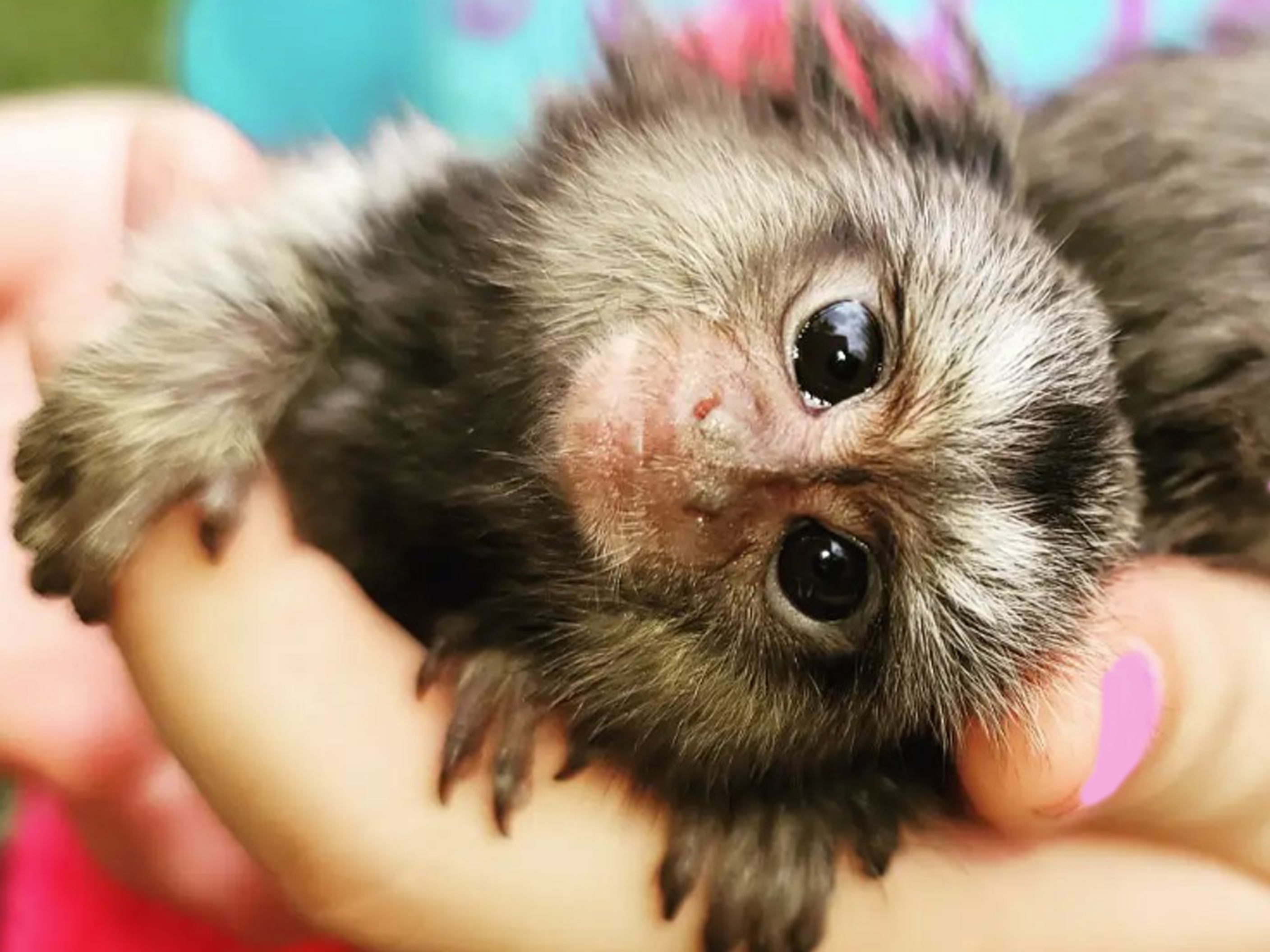
Marmoset Diet
Preparing Food For Your Adult Marmoset Monkey
A balanced diet is critical for the health and longevity of marmoset monkeys. In the wild, marmosets have a varied diet, which includes fruits, leaves, insects, and small animals. However, caring for marmosets in captivity requires a careful approach to nutrition to ensure they receive all the necessary vitamins and minerals for a healthy life.
When preparing food for your adult marmoset, it's essential to mimic the nutritional content they would naturally obtain in the wild as closely as possible. This includes a variety of fresh fruits and vegetables, protein sources, and the correct supplementation of vitamins and minerals.
Vitamin supplements
Vitamin A and D3 supplementation is a critical component of a marmoset's diet, especially for those that are housed indoors and do not have access to natural sunlight. Vitamin D3, in particular, is crucial as it aids in calcium absorption and promotes healthy bone development. Since marmosets are not exposed to outdoor sunlight, which naturally provides vitamin D3, supplementing this in their diet is necessary.
It is recommended to give 1 drop of a Vitamin A/D3 supplement per animal every day. This precise dosage is important as an overdose can lead to health complications, such as hypervitaminosis D, which can cause bone deformities, and organ damage.
Twice a week, it is beneficial to include insects such as mealworms, grasshoppers, crickets, and even mouse pinkies to provide the necessary protein and enrich the diet. These items not only provide essential nutrients but also offer behavioral enrichment, allowing the marmosets to indulge in their natural foraging behaviors.
Feeding Times
Marmosets should be fed once a day at noon or, for better dietary management, twice a day in the morning (before 9:00 A.M.) and in the evening (before 6:00 P.M.). This schedule helps in mimicking their natural feeding patterns and aids in maintaining a routine, which is beneficial for their overall well-being.
When preparing their food, it is advisable to cut all items into small, manageable pieces, roughly 1cm square, to facilitate easy eating and digestion. The size is also important to prevent choking hazards and to ensure that the marmosets can comfortably handle and consume their food.
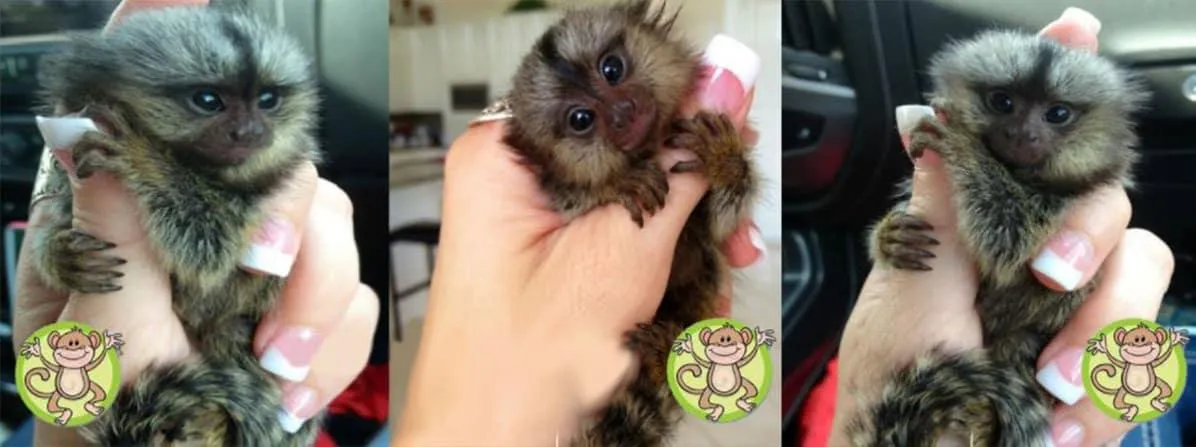
Housing a Marmoset Monkey
Outdoor Marmoset Monkey Cages
for Adults
Outdoor cages for adult marmoset monkeys should be sturdy and spacious with natural climbing structures and shelter to protect from the elements, while allowing ample sunlight for health benefits. They must be secure to keep the marmosets safe and to provide a stimulating environment that caters to their need for exploration and play.
Outdoor marmoset monkey cages need to be at least 95% covered from the sun and rain. Leave a 1 foot overhang roof on the front and both sides of the cage – the back side will be designated for letting in sunlight. Keep the cage uncovered for about 1 foot or less in the back.
The bottom of the cage should be at least 2 feet elevated off the ground on legs. (Best would be pipe) Cages should be made out of galvanized after-welding wire and stainless steel clamps so that it will not rust. The wire holes should be small holes, maximum of 1/4inch by 1inch rectangles. Their nest box and food should not be exposed to rain and sunlight which is why the roof overhangs a foot on three sides. Visit our Cages Page for more information about purchasing a pre-made custom built cage for your Pet Marmoset Monkey.
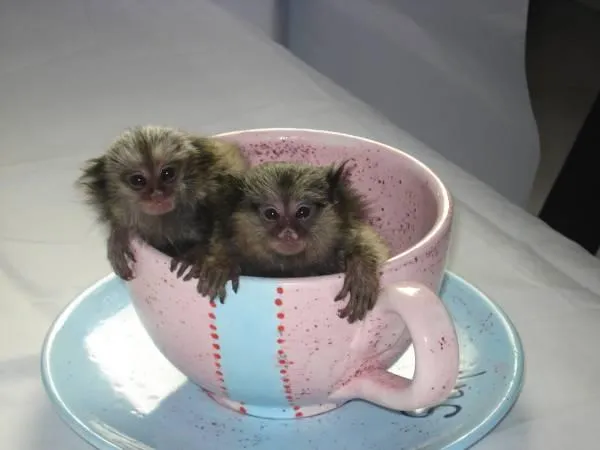
The nest box should be 1 cubic foot – 1 foot by 1 foot by 1 foot, made from 1 inch thick plywood screwed together with stainless steel screws, and painted with non-toxic paint. A 4 inch diameter circle hole for the entrance should be drilled on one of the sides of the boxes. Inside the box goes 3 or 4 dish towels which need to be changed every 4 months. The box should be on the outside of the cage so that the only thing exposed to the monkey is the entrance hole of the nest box. The rest of the box should be protected by the wire so the monkeys do not chew on the nest box wood from the outside.
These marmoset monkeys do not fare well in the cold weather. Keep your marmosets indoors for temperatures under 60 degrees
Fahrenheit. Under even colder conditions, we also advise the use of a heating pad covered by a towel so no part of the pad or wire is exposed to the monkey. They will chew on the pad and/or the wire and cause damage to the heating pad and/or themselves.
Cage Size
Check with your local fish and wildlife department for your minimum requirements for housing your pet marmoset monkey. Cages should be a minimum of 3 feet wide by at least 6 feet long and 6 feet high.
Despite their small size, marmosets need a relative large area. Minimum sizes are 6 ft tall (2 meters), 3 ft deep (1 meter) and 6 ft wide (2 meters). The wide size is important because marmosets live in trees. It’s easy, how bigger how better. If possible create outdoor enclosures with a heated indoor cage. Many marmosets, like all monkeys, show signs of boredom in captivity. So, use a lot of different items in their home.
Items Needed Inside Every Cage
Branches must be a very hard wood, non-treated and non-toxic. For example, we use dragon-wood, similar for what they use for parrots.
Swings are good as long as they are non-toxic and non-chew-able. No ropes made with glue.
Toys – all plastic baby toys approved for human babies are fine. i.e. rings, balls with bells, small squeaky toys , etc.
Platforms can be made of the same welded wire. Not wood. They will chew it!
Indoor Marmoset Monkey Cages for Adults
Indoors are just like outdoor cages with a few exceptions. There is no roof needed and cages still need to be off the ground at least a foot or two so that monkeys cannot reach their old food or feces. One important thing you must add is a vita-light which is an imitation sunlight lamp, similar to the ones used for reptiles. It should be the length of the cage and on at least 12 hours a day. Wires and the lamp itself should be kept out of reach from the monkeys.
Environment
Change their environment from time to time.
You must clean indoor cages every week. It is very important that you sterilize their cage. Clean the nest box EVERY 3 DAYS and the cage every week at the least. Use a mild disinfectant or bleach 50/50 with water to clean their cage. They need a temperature of 20°C – 25°C in indoor marmoset monkey cages (use also heat lamps). For outdoor cages, don’t forget to provide 95% shade.

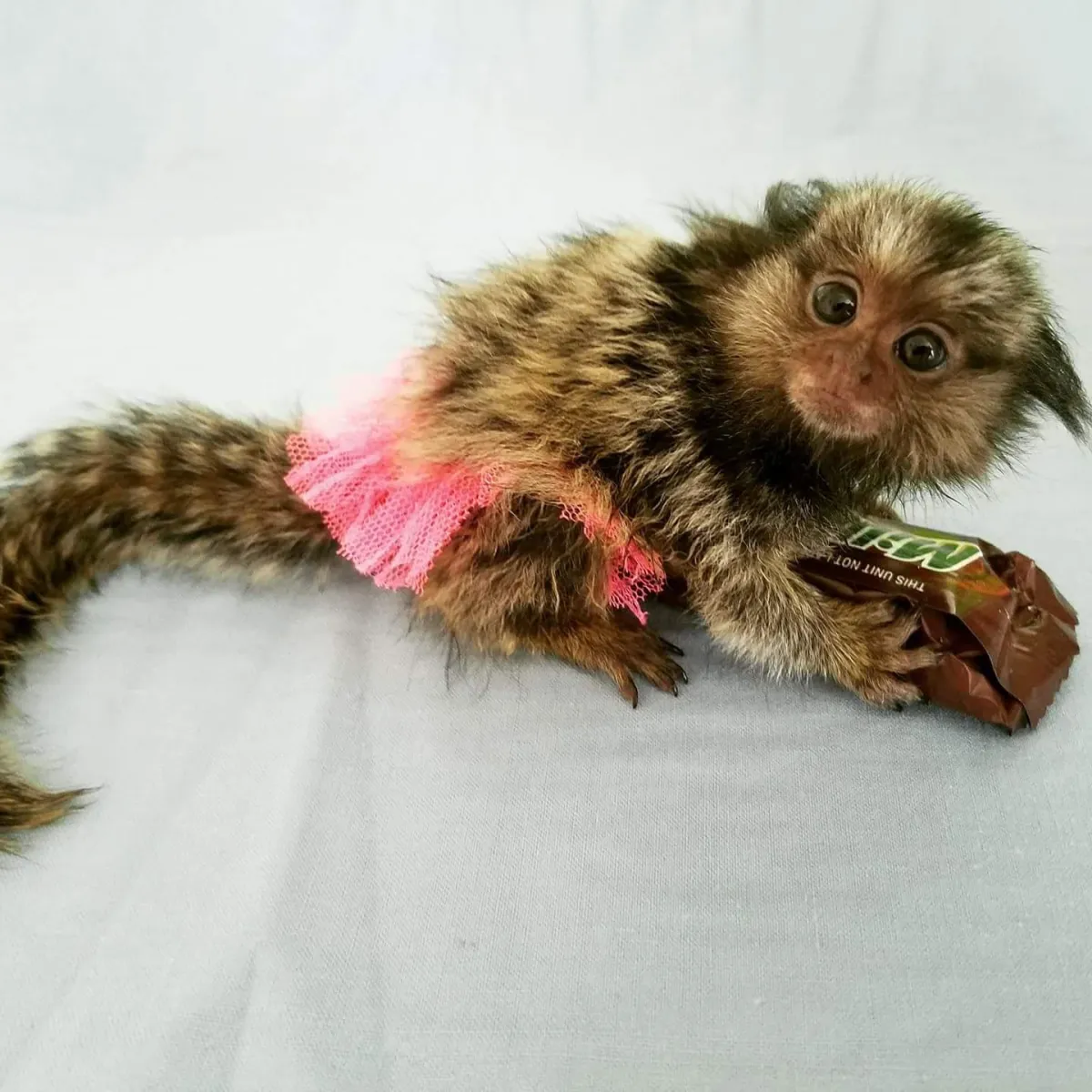
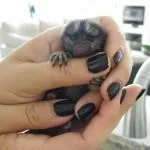

Poggi's Animal House Davie, Florida 33325 USA (PRIVATE SANCTUARY ONLY.)
NOTE: WE ARE NOT OPEN TO THE PUBLIC EXCEPT FOR MONKEY PICKUPS ON SCHEDULED DAYS.
FINANCING - DELIVERY - TRAINING AVAILABLE!!!!!
DISCLAIMER: It is illegal for us to business with anyone who does not live in the United States or within the following states inside the U.S.: Alaska, Arizona, California, Colorado, Connecticut, Georgia, Hawaii, Illinois, Iowa, Kentucky, Louisiana, Maine, Maryland, Massachusetts, Minnesota, New Hampshire, New Jersey, New Mexico, New York, Oregon, Pennsylvania, Utah, Vermont, Washington. If you live in any of these areas, we will keep you on our mailing list in case you move to a location where it is legal for you to own exotic animals. You may always opt-out at any time.
TERMS OF SALE: All deposits made toward the purchase of a monkey or any exotic animal from Poggis Animal House, LLC are strictly non-refundable under any circumstances. The full balance of the agreed purchase price must be paid in full within twelve (12) months from the date the first deposit is received. Monkey's are inspected by a veterinarian prior to you receiving animal and must be inspected by a USDA licensed veterinarian with 2 days of receiving the monkey. All animals are sold as is. These statements are only a portion of our Terms and Conditions. Review our FAQ and the Terms and conditions to fully understand your responsibility of this transaction.
© 2024 PoggisAnimalHouse.com
